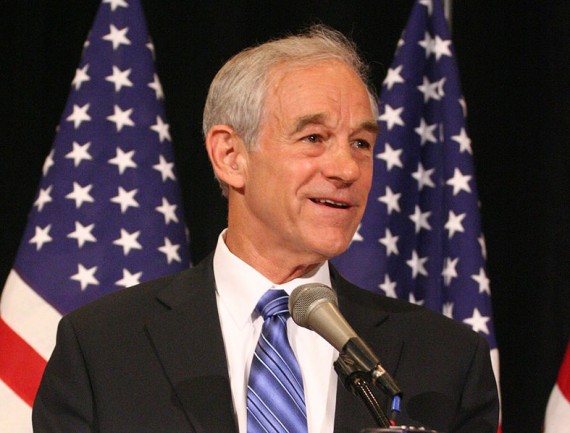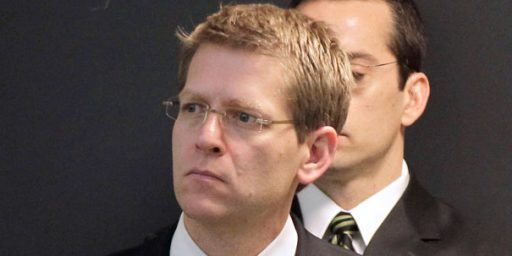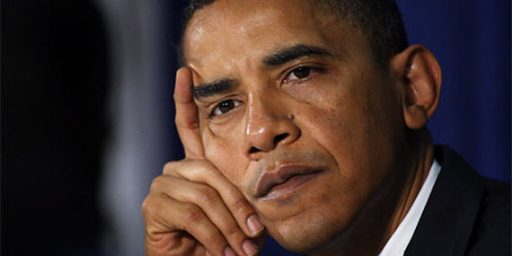Ron Paul’s Past Will Catch Up With Him
Ron Paul is rising in Iowa, which means he will soon face the scrutiny he's avoided so far.
With the latest PPP poll showing Ron Paul in the lead among the Republican candidates in Iowa, a projection which Nate Silver backs up in his latest forecast, Tim Carney asserts that a Paul victory in Iowa will lead the establishment GOP and the media to unleash a whirlwind against him:
There are many reasons he is unacceptable to the Republican elite. Some of these transgressions reflect badly on Paul. Others reflect badly on the party.
In Paul’s favor, he holds to the professed principles of his party. He makes Republicans look bad by firmly opposing overspending and the unconstitutional expansion of federal power. He correctly predicted the troubles that would be caused by housing subsidies and the U.S. invasion of Iraq.
Paul is also disliked for his foreign policy. His non-interventionism has provoked clashes with the party elites, but it resonates with a growing number of Republicans who have grown tired of endless war and nation building that doesn’t seem to serve American interests. But Paul regularly goes too far for even these voters, criticizing the killing of al Qaeda leaders and at times sounding like he agrees with Iran’s grievances against the United States.
But neither his establishment-irritating adherence to principle, nor his hawk-angering foreign policy, will be the focus of the anti-Paul attacks should he carry Iowa. His conservative critics and the mainstream media will imply that he is a racist, a kook, and a conspiracy theorist.
Carney is a Paul fan, so it’s understandable that he’d see intra-party opposition to his preferred candidate as some kind of nefarious establishment plot but, as Jonah Goldberg notes, how is what he describes here any different than what the other “Not-Romney’s” (Buchanan, Perry, Cain, Gingrich) have gone through over the past five or six months? There’s no question that many of Paul’s policy positions, while they do attract a vocal and hard-working group of mostly independent voters, are out of step with the Republican Party base in several important respects. That’s why you see him doing better in states where independents are allowed to participate in candidate selection, such as Iowa and New Hampshire, than he does in states where primaries are only open to registered Republicans such as Florida. Paul also tends not to poll well in states where Republican voters dominate the state and tend to vote very conservative, such as South Carolina. That’s the reason I agree completely with James Joyner’s statement last week that, regardless of what happens in Iowa, Paul is not going to be the Republican nominee. To put it bluntly, he has no path to victory and lacks the resources to compete with the Mitt Romney’s of the world in delegate-rich states like Pennsylvania, New York, Ohio, and California, all of whom have closed primaries to begin with. Paul is benefiting right now from the quirky nature of the electorate in Iowa and New Hampshire, but once he gets beyond there he really won’t have anywhere to go.
There’s also another simple truth about the Iowa Caucuses, and that is that they simply aren’t a good indicator of which way the race is going to go, especially on the Republican side of the aisle. Since 1976, only three candidates who won the Iowa Caucuses where there was actually a contest went on to win the nomination —- Ford in 1976, Dole in 1988 , 1996 and George W. Bush in 2000. Of course, only one of those three actually went on to become President, and that was by the narrowest of Electoral Vote margins. So, winning Iowa doesn’t necessarily mean anything at all. For Republicans, a better indicator is South Carolina, where the winner has gone on to win the nomination in every contested race since 1980. In that state, Ron Paul is currently in fourth place in the RCP poll average.
In other words, success in Iowa is not at all indicative of the likelihood of success nationwide, so when other Republican seek to down play the importance of Paul’s victory, they’ll sort of have a point.
Carney is also concerned that Paul’s past is going to catch up with him:
Paul’s indiscretions — such as abiding 9/11 conspiracy theorists and allowing racist material in a newsletter published under his name — will be blown up to paint a scary caricature. His belief in state’s rights and property rights will be distorted into support for Jim Crow and racism.
What Carney dismisses as indiscretions include such things as being a regular guest on the radio show of a man named Alex Jones, who has asserted openly for years that the government is lying to the American people about the September 11th attacks, and suggesting openly that the attack was actually conducted by someone other than al Qaeda even though Osama bin Laden claimed credit for the attacks on more than one tape released during his life time. Jones also dabbles in other conspiracy theories that remind one of the “black helicopter” crowd that gained prominence back in the 1990s. Now, one could say that Paul shouldn’t be held responsible for the views of someone whose radio show he appears one, but when you’re a sitting United States Congressman and a three time candidate for President, appearing on someone’s show does tend to lend them a degree of credibility.The fact that Paul continues to lend credibility to people like this is something that is simply not going to look good if and when the media starts paying attention to it.
The other indiscretions on Carney’s mind are, of course, the infamous newsletters, which Steven Taylor has written about extensively here and here. The newsletters story isn’t new, of course. It came out during the 2008 campaign and those of us who were writing about the that issue and other problems with the Ron Paul campaign created by his decision to refuse to dissociate himself from extremist elements warned that Paul was not the best messenger for libertarian ideas in the GOP (A small sample of what I was writing at the time can be found here, here, here, here, here, here, here, and here.) Most people don’t know anything about this story, though, and Paul’s explanations, both in 2008 and now, just don’t add up. Saying that you were unaware of what was being published in your own name over a period of several years, when it was clear that the publication in question was a huge sources of income, simply doesn’t add up. Just like Newt Gingrich’s business dealings after he left office are fair game, so are Ron Paul’s associations with people that most Americans would consider to be wildly radical. This is why I would have preferred Gary Johnson to be the standard bearer for libertarian ideas in this race than Ron Paul, who still seems to me to be engaging in a “Last Hurrah” rather than a serious campaign.
So, yes, if Paul wins Iowa, or comes close to doing so, the “establishment” will bring all of this up, because it’s relevant. They’re also likely to talk about Paul’s affinity for the Gold Standard and his foreign policy views, which may end up being his Achilles Heel before all of this is over. They’ll do so because that’s how a frontrunner gets treated. It’s not a vast conspiracy, it’s politics and it’s part of the price you pay for running. Congressman Paul is probably used to it by now, and his supporters need to do so as well before they become caricatures of themselves.






A fair assessment of the situation. I’m sure my fellow Ronulans won’t react so kindly, though. 😉
Texas voters do not register by party, hence primaries are not closed here.
haha, you got to love the guy: http://thefunniestwebsiteeverbuild.com/political-pictures-ron-paul-shoes-fabulous
@Boyd:
My mistake……
Are you daft?
It’s a Caucus. The first Caucus.
It’s not a a Primary, certainly not an open or semi-open Primary.
What comes out of the Iowa Republican Caucus is usually pure, unadulterated Midwestern SoCon id. They don’t hedge their bets like the D’s did in 2004 who went for Kerry’s supposed electability over Dean’s base rapport.
The rules for the Iowa caucuses are different for Democrats and Republicans. For the R’s it’s simpler – you vote for the candidate you want and that is represented in the tally to the state total.
There is no incentive to hedge your vote or pick the Establishment candidate. So folks are gonna want to get their freak on, in an Iowa sort of way. Hence Huckabee, the folksy fascist ; – )
If you’re one of the Caucus goers, you know you’re the first and the forefront and so many of them try to bend the Party to their will in selecting, not a vanity candidate per se, but one who is most representative of their point of view. They know it will be judged and “corrected” down the line in the Primary season, but it is their time to shine. So shine they do.
Caucuses are not Primaries. And the first Caucus is the most unlike a Primary.
@de stijl:
And thus you have given another reason why the Iowa Caucuses tell us absolutely nothing about race for the nomination as a whole
…One thing that is rarely mentioned is that Paul is 78 years old.
…Realistically he could be gone at any time.
… In the past this has always been a legitimate issue. With Paul it is never even discussed.
@Blue Shark: That’s probably because he’s in excellent health and very physically fit. Look up his bike ride challenge to his rivals.
@Doug Mataconis:
No, it tells us what some yahoos who think themselves to be the heart of the Party wishes the Platonic Ideal Nominee should be.
Why are people so fixated on the predictive failure of the early states? It’s frigging insane. I don’t look at the box-scores from the first weekend of April to make my travel plans for the World Series.
Iowa and New Hampshire are the agenda setters and nothing more. And they almost always fail to set the agenda they way they want, but they try.
And you’re obviously just a “Horse Race” boy given this comment.
…OH HAPPY DAY…
Could the race really get this interesting??? I mean…I’ve been living right…but I’m not sure I deserve this.
Good post Doug, but Dole was in 1996.
@Keith Humphreys:
Good catch, Keith. Although Dole did win Iowa in both 88 and 96.
Paul can not be the republican nominee (although the way its going this time …..naugh, cant happen) but he is much more dangerous than any of the other nominees. Paul has a dedicated and truly grass roots organization. He is 78 and this is it for him. And he has run as a third party candidate before.
Mishandle Paul and the repubs run the risk of him going independent in the general election. He is so close to retirement that he has nothing to lose and in an election between Romney and Obama in 2012 with all the huge disconnect between beltway politics and main street America, Paul could easily get north of 10% of the vote. With a good campaign it is reasonable to expect he could out do Perot’s 19% in 1992.
He may not win the nomination but putting him on the ticket might be the price the repubs pay for blasting him now. So is he a viable VP nominee?
There is more s* to be thrown in the fans. Paul brought Thomas DiLorenzo(A member of the League of the South) to testify in Congress.
@André Kenji de Sousa: DiLorenzo already responded to this accusation.
I don’t think most of these things will factor too heavily in a Republican primary. I would even go as far as saying that “establishment” or media voices trying to paint him as a racist or drawing parallels between his fierce states’ rights position and Jim Crow might garner him some sympathy among conservative voters, especially in the South. As a group I think they are far more likely to sympathize with what they perceive to be incessant and unfair calls of racism than they are to be turned off by someone with a spotty record on the subject. The general election would be another story.
The 9/11 trutherism or other conspiracy type associations he has might play. But I’m inclined to think that someone willing to vote for a candidate whose views are as distinct and unique as Paul’s are in this field wouldn’t be entirely turned off by this, or at least might be willing to accept his explanation of it.
Eric Williams
But being associated to Tomas DiLorenzo is a liability, not an asset.
Ron Paul is now at 28% in Iowa, first place. He’s been in first place in each of the three most recent polls there.
Does this mean Doug will have to get a job in the private sector now?